May 23, 2025 | 11:56 GMT +7
May 23, 2025 | 11:56 GMT +7
Hotline: 0913.378.918
May 23, 2025 | 11:56 GMT +7
Hotline: 0913.378.918
Mr. Dang Van Huy, owner of Dang Farm in Cu Sue commune, Cu M'gar district, Dak Lak province has been growing durian since he was a child. Mr. Huy's family currently owns over 7 hectares of organic durian production area. Additionally, his durian has been recognized as a 3-star OCOP product. Accordingly, the Dang Farm branded frozen peeled durian product has been awarded 3 stars.
According to Mr. Huy, participating in OCOP production is to support the one commune one product program. “The majority of OCOP production focused on coffee crops in the past. I wanted to make a difference with a Vietnamese durian brand. In my opinion, if I can do it then other farmers can too. This will help bring Vietnamese durian to more consumers around the world”, Mr. Huy said.
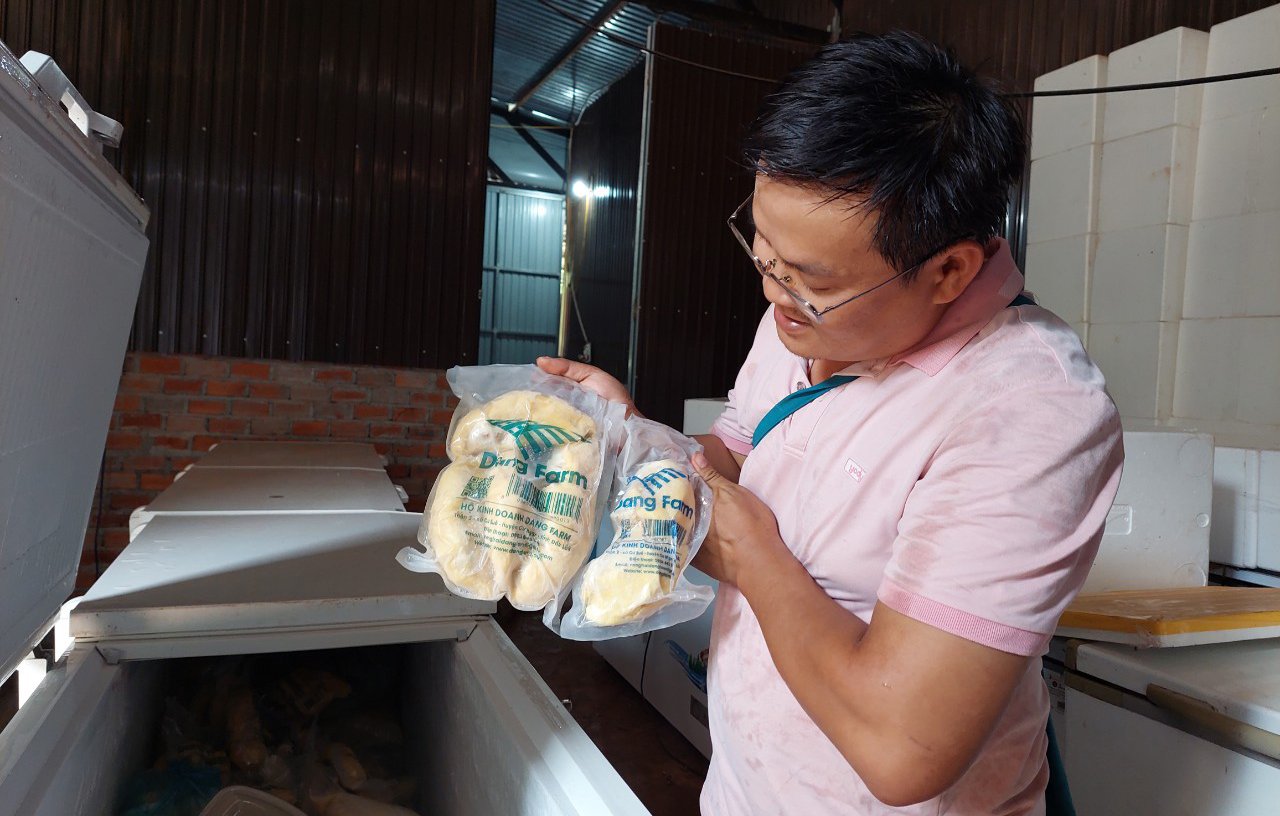
Dang Van Huy, Dang Farm owner was the first to build the OCOP durian brand in Dak Lak. Photo: Quang Yen.
Mr. Huy encountered numerous challenges difficulties when he first started growing OCOP-certified durian products. According to him, the testing of dried goods is relatively simple. However, the testing process for frozen durian products requires him to schedule an appointment at the Regional Testing Center 3 in Ho Chi Minh City.
After scheduling an appointment, Mr. Huy must package the durian product and ship it to Ho Chi Minh City from the previous day so that the center can begin the testing process the following day. “The testing process last for at least three days through hot, cold and anaerobic environments. As a result, the testing cost is higher than that of other products. In addition, I also have difficulties filling out the paperwork on my own, so it was a lot of trials and erros", Mr. Huy shared.
Regarding his goals in producing OCOP durian, Mr. Huy commented that he aims to establish a distinctive Vietnamese durian brand. Accordingly, Vietnamese businesses often pack fresh fruit for export. As a result, the storage window for durian fruit is limited. Conversely, Mr. Huy's farm harvests and freezes ripe durian that have fallen to the ground.
“When consumers purchase frozen products, they will have access to only the most appealing fruit pieces. By freezing them, durians will be able to reach their highest quality. Our long-term goal is to deliver ripe durians to consumers and avoid being taken over by the market", Mr. Huy explained.
Dang Farm started organic farming process in 2009 in order to build a clean durian farm in accordance with OCOP's standards. Mr. Huy was initially prevented by his family because they believe the model to be ineffective. Most notably, the output of the farm was lower compared to that of previous traditional farming methods.
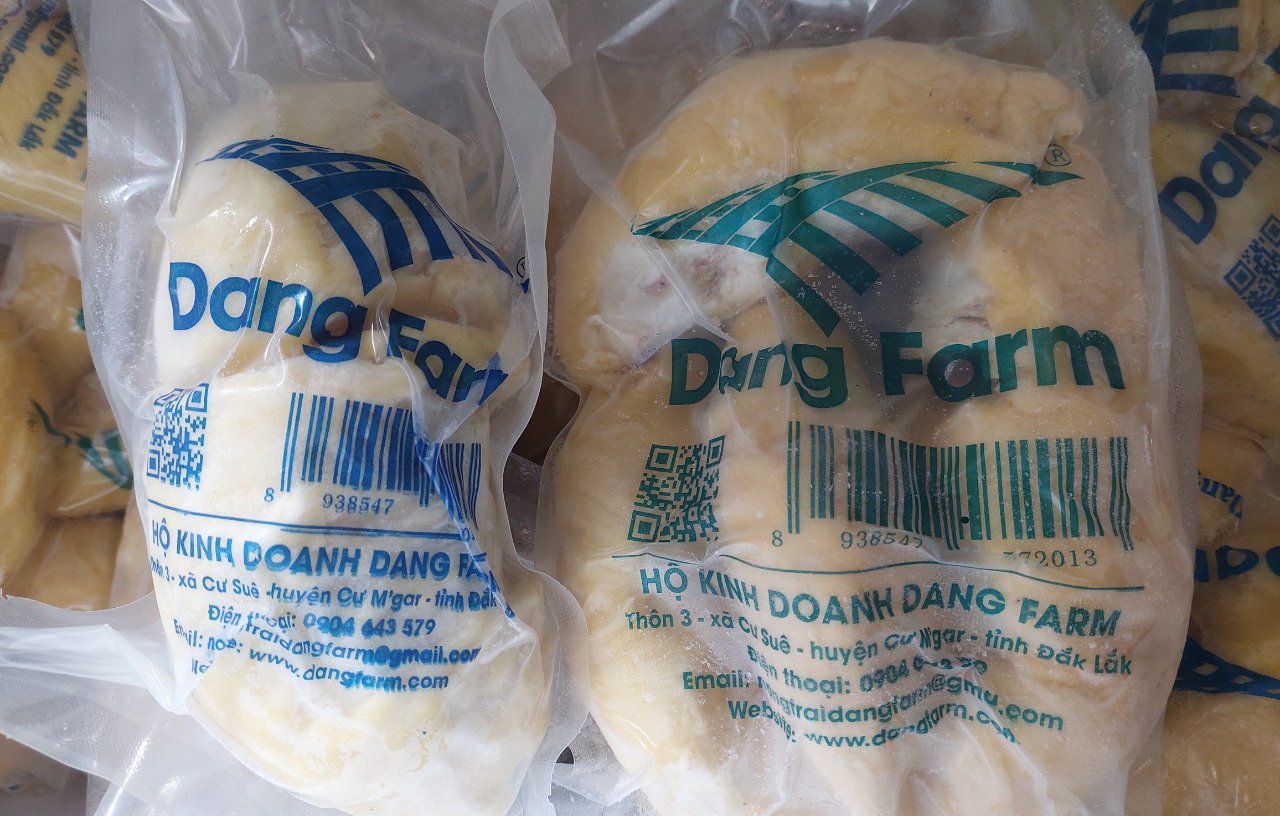
The farm's frozen durian products are priced between 250,000 and 270,000 VND per kilogram. Photo: Quang Yen.
However, Mr. Huy was determined to build an organic model because his past experience abroad taught him that developed countries were meticulous in the production. In addition, consumers in these countries typically follow a simple diet and prioritize the quality of the products.
“I initially pursued high-tech agriculture. However, I changed my mind after learning of these meticulous agricultural production models. My family members were vehemently against my idea of implementing these models when I first returned to Vietnam. We only started our harvest after implementing the model for seven or eight years. It was a significant shift from an industrial farming process to a fallen durian farming process”, shared Mr. Huy.
During the implementation process, Mr. Huy refused to cut the fruit in order to accelerate the growth of the trees. According to him, farmers should not try to influence the physiology of the tree. “You must allow the trees to grow naturally in order to harvest their fruits. This farming process will generate a lower income compared to other durian growing models. However, I am happy to earn 2 to 3 million VND every day", Mr. Huy added.
Dang Farm's OCOP frozen durian products are currently sold at specialty stores in Dak Lak province. Ri6 durians are priced at 250,000 VND per kilogram whereas Dona durians are priced at 270,000 VND per kilogram. The farm produces approximately 15 tons of peeled durian every year.
“After deducting expenses, we earn over 1.5 billion VND in profits at the end of the year. Our OCOP products are currentlyy sold within the province. We aim to reach other markets domestically and internationally in the immediate future. The farm wishes to cooperate with a passionate business in building and developing Ri6 durian. Namely, Ri6 durian protects the environment and they are free from many pests and diseases. Additionally, the usage rate of fertilizer and pesticide for Ri6 durian is low", Mr. Huy added.
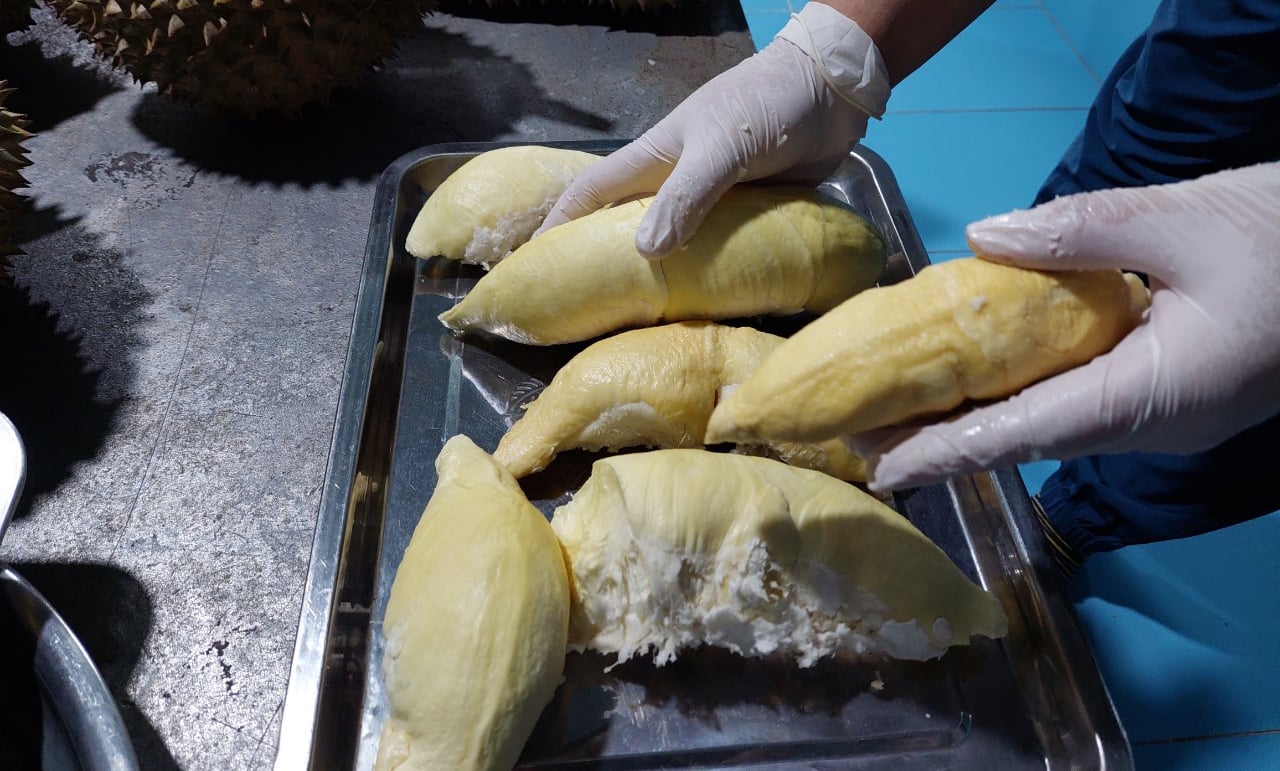
Mr. Huy's farm leave durians to ripen naturally. Photo: Quang Yen.
According to Mr. Huy, his family was the first household to begin growing durian in Dak Lak province in 1997.
In the early days, his family had to water the durian trees with buckets of collected water due to droughts. The majority of farmers could only sell durians for less than 10,000 VND per kilogram in the past. Subsequently, the prices of new durian have steadily climbed over the last three years.
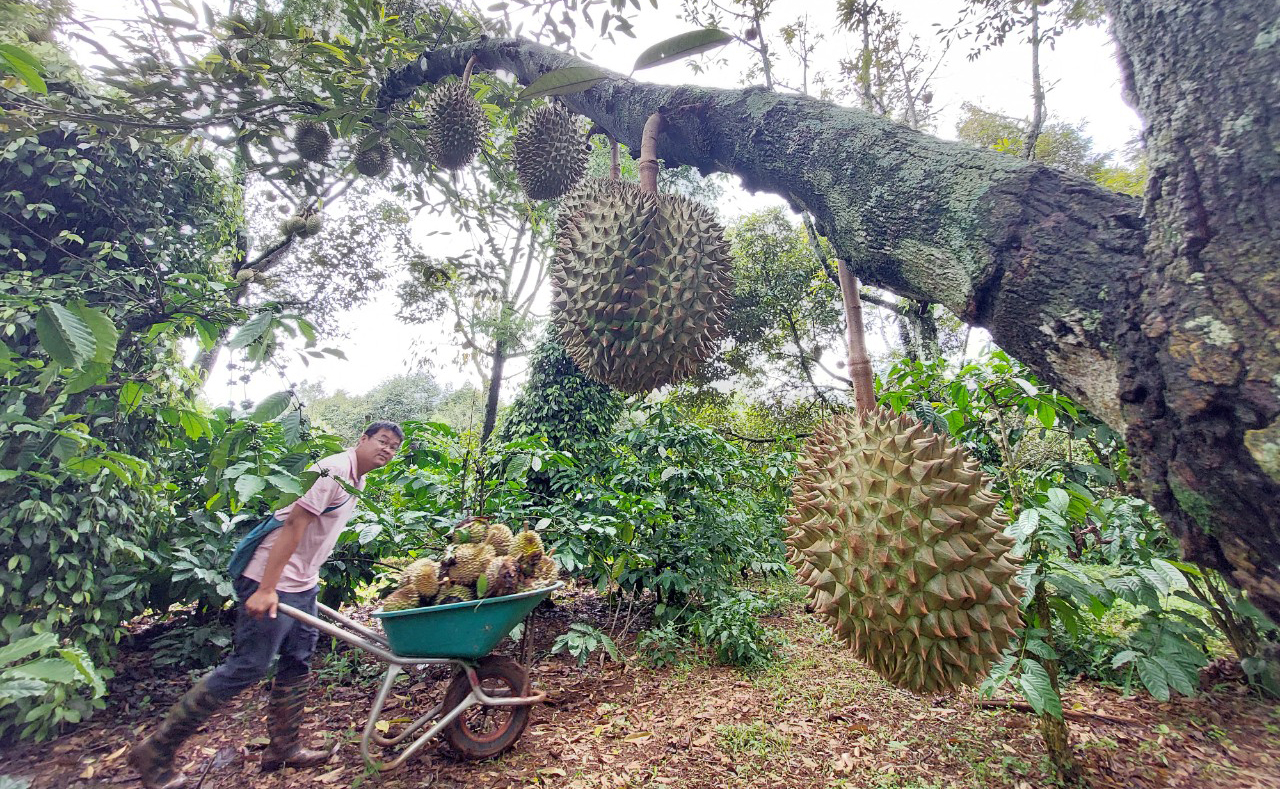
Dang Farm's durian is grown organically and left to ripen naturally. Mr. Huy manually harvests ripe durians from the farm every day. Photo: Quang Yen.
“We have to spend between 150and 200 million VND on fertilizer and pesticide for every hectare of durian. For inexperienced farmers, this cost can even reach over 200 million VND per year. Without proper investment, the Dona durian will fall prematurely, causing crop failure.
However, the Ri6 durian only costs between 30 and 40 million VND for fertilizer and pesticide per year. Ri6 durian is considered to have a stronger fragrance and sweeter taste compared to Dona durian. As a result, production of Ri6 durian will help protect the environment and limit risks. In addition to the Chinese market, the Ri6 durian can meet the requirements of several other countries", Mr. Huy explained.
According to him, durian trees require extensive care. The majority of farmers currently focus solely on quantity instead of quality.
The owner of Dang Farm commented: "I want to establish a durian brand in Dak Lak province before expanding to reach other markets in Vietnam. Farmers are mostly concerned with profits instead of the quality of the final product. I am also interested in environmental issues. Farmers cultivate durian without appropriate planning, which can be detrimental to the environment in the long run. As a result, they need to change their farming mindset towards environmental protection and quality improvement, in order to sustainably develop the durian industry.
Translated by Nguyen Hai Long
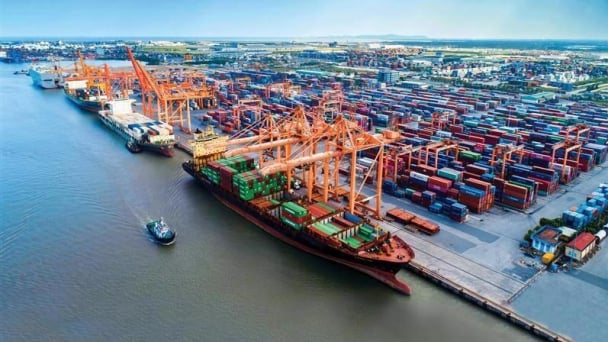
(VAN) South Korea is currently the second-largest investor in Hai Phong in terms of the number of projects (186 projects) and the largest in terms of total registered investment capital, reaching USD 14.2 billion.
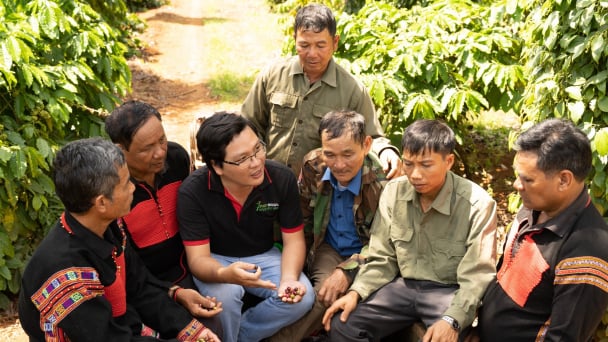
(VAN) As consumers become more environmentally conscious, legal regulations grow increasingly stringent...
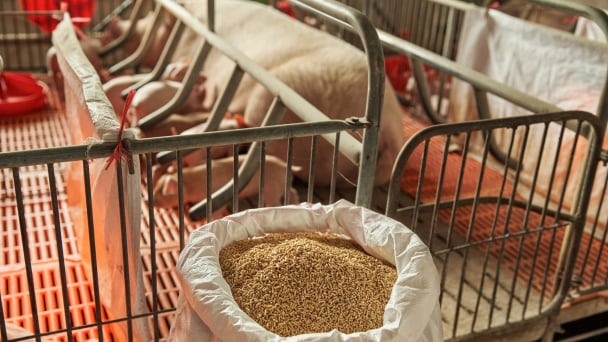
(VAN) CJ Feed&Care officially launched the FCR improvement campaign called “2025 Find Challenge Reach” in April 2025. In Vietnam, this campaign is implemented by CJ Vina Agri.
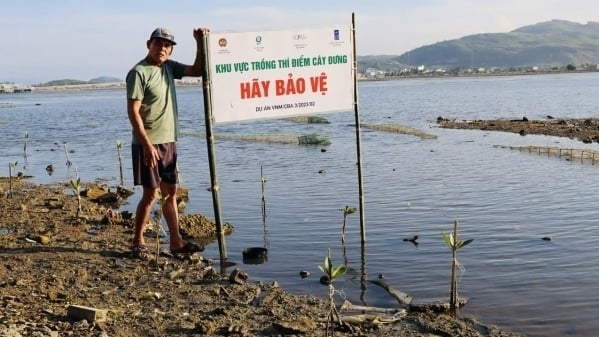
(VAN) The swamp in Pho Thanh is gradually being covered with red mangrove, creating a favorable environment for producing clean, high-quality salt.

(VAN) The trade turnover of agro-forestry-fishery products is growing significantly, along with investment cooperation commitments that are opening up new development directions between Vietnam and Russia.

(VAN) Khanh Hoa is investing over 545 billion VND to develop 240 hectares of high-tech marine aquaculture in order to guarantee a consistent supply of seafood exports and achieve the USD 1 billion target.

(VAN) Minister of Agriculture and Environment Do Duc Duy held a meeting with Soopakij Chearavanont, Chairman of C.P. Group, on May 15.